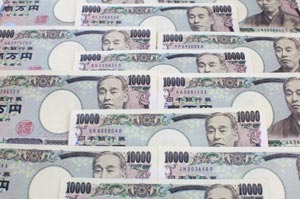Japan’s devaluation of the yen, which is aimed at boosting a flagging and deflating economy by helping exporters sell more goods abroad, may cause problems for other exporting nations.
While Japan’s exports are now more competitive thanks to a fall in the yen, this will cause problems to other countries, including South Korea, China and Germany.
Economic analysts say that their exports will be hit because the bulk of Japan’s is much like theirs – electronics, cars and machinery.
However, this isn’t the first time that the nation’s leaders have decided to devalue the currency with a view to boosting the economy – with three attempts in just over 20 years: April 1995, September 2000 and again in January 2005.
Each time, Japan saw mixed results from the economic move, and from 2005 to 2007 exports rose by 31% – faster than South Korea and Germany, but way behind China’s 68%.
Currency wars
Dan Morris, a strategist at JP Morgan Asset Management, says that while the yen’s depreciation will inevitably boost earnings for Japanese exporters, there needs to be much stronger domestic demand and profitability to ensure the country’s long-term goals.
He added: “Japan’s competitors are now at a price disadvantage but looking at previous devaluing episodes it’s not clear cut what the impact will be on equities and exports.”
He also points out that before its recent depreciation, the yen has fallen by 23% since July 2012, the currency appreciated strongly in the financial crisis and is now still higher than in December 2007.
The big issue now for Japanese firms is to move beyond their currency gains and to increase revenues and profitability which will help sustain equity gains.
Japan’s efforts to bolster the nation’s economic future come at the same time as China’s growth there seems to be slowing.
Yen depreciation
The markets were taken aback when its first quarter GDP growth figures came in at 7.7% instead of the predicted 7.9%.
Virginie Maisonneuve, head of global equities at Schroders, said investors should not look to one quarter’s figures, but instead look to the longer term where the global economic recovery will be led by the US and China.
She added: “This global recovery will also be supported by the decisive reforms in the world’s third largest economy, Japan.”
China reason, she says, still investing heavily in its infrastructure and that many sectors of the economy are still posting strong growth figures.
But while growth in China may not hit double digit figures for a long time to come for country will still see sustainable growth as domestic consumption increases to help drive its economy.
